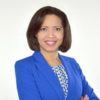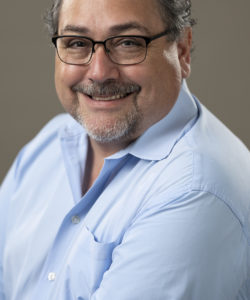
We have an extremely active program of co-curricular program, lectures, workshops and skill development programs to make sure students feel connected and well served.
With a varied background, Randall Iden eventually discovered a passion for communication theory and never looked back. As a lecturer and new Faculty Director at Northwestern's Master of Science in Communication program, Iden is able to share that passion with the next generation of communications professionals. Read on to learn more about Iden's role as an educator, Northwestern's MSC program offerings, and what kind of communications careers students are poised to achieve upon graduating.

Tell us about your background?
I am a 2002 graduate of the Northwestern Masters of Science in Communication. I had been a lawyer and worked in the plastics business prior to entering the program. I entered looking for a way to consolidate my interests and experiences into a career in communication. Instead, I found I was so interested in the theoretical side of the field that I applied to the Ph.D. program earning my doctorate in Rhetoric and Public Culture in 2012. After teaching as an adjunct at several universities, I was hired as a full-time lecturer for the MSC in 2016 and, as of September 1, 2018, I am the Faculty Director of the Program. I currently teach Strategic Communications and a course in Ethics. In addition, I helped launch and manage the capstone projects for the MSC.
What differentiates the Northwestern MSC (Masters of Science in Communications) program from other schools?
The MSC was founded in 1982. It is one of the oldest communication masters programs in the country catering to the needs of working professionals. Currently we offer two tracks, the Custom Leadership Program and the Hybrid Leadership Program. The Custom Program (CLP) is 11 months in duration and students take classes on our Evanston campus on Saturdays. The Hybrid Program (HLP) is also 11 months long but students take courses online and come to campus four weekends for in-residence programming. The two programs give students the choice of two different but consistent formats to earn a master’s degree. Finally, the program is incredibly diverse. We have students representing more than two dozen different professional industries, more than 10 countries, a 30+ year range of experience levels, and multiple ethnic and cultural backgrounds.
Talk to us about the class sizing and curriculum of the MSC offering?
Students in the CLP program take one core course and one elective each quarter. The cohort averages about 65-70 students. Electives are capped at no more than 24 students per class. Our curriculum was substantially revamped in 2016 and is based on three curricular themes: managing complexity, collaborative leadership and elegant communication. Each course is designed to enhance one or more of the curricular themes and one or more designated learning outcomes. We teach courses a broad range of classes including Strategic Communication, Change Management, Networking, Content Marketing and Team Dynamics.
Why should a student come to your school to get their MSC?
Our students regularly point to the knowledge and skills they gained in the program and the network they have established. We have over 35 years of experience in training leaders to engage many different types of organizations. Our interactive curriculum combines communication theory with practical applications to give students the skills to be immediately valuable in the workplace. The cohort experience is highly collaborative enabling students to develop very strong professional and personal relationships with each other. These connections lead to a deeper understanding of the material as well as future career opportunities and lifelong friendships.
We have students representing more than two dozen different professional industries, more than 10 countries, a 30+ year range of experience levels, and multiple ethnic and cultural backgrounds.
What job related industries are your students focusing on post-graduation?
Our graduates work in a variety of professions in private, public and non-profit fields. We have always trained managers in communication and other professional areas including Advertising, Public Relations, Marketing, Media, Human Resources, Consulting, Manufacturing, Finance, Healthcare, and Higher Education. Particularly in our HLP program, we have a large number of senior managers including several from C-suite positions. The MSC is unique in its ability to work with professionals at all stages of their careers.
Learn more about post graduate communication careers.
What type of internships does your program provide?
Since most of our students are working full or part time, we do not have specific internships, but we support students in finding internships if desired.
Tell us about your faculty. What are the characteristics you focus on to lead your programs?
Our faculty comes primarily from the Department of Communication Studies in Northwestern University’s celebrated School of Communication. The faculty instructors are experienced teaching working-professionals, are experts in their fields of study and are highly regarded researchers. We also are able to utilize adjunct professors who have experience in the fields of marketing, public relations, content creation, and global consulting. Our goal is to give students the information and challenging questions that will help them in their current careers or to pivot to new paths.
Benefits for students pursuing online MSC as opposed to on campus?
We believe that both our CLP and HLP provide the face to face instruction and cohort bonding that make for an impactful course of graduate study. The HLP uses the most up to date methods to ensure that online content is stimulating and invites group participation. The friendships and networks that our students build in the MSC are among the most important aspects to the experience.
Online Programs - Prospective students may worry online education sacrifices personalized learning for convenience. How do online schools support students, particularly within self-directed programs? What can instructors do to ensure students feel connected?
The MSC program has a robust student services team that assist with course counseling, career consultation and individual support. We are very experienced in handling the bumps that show up in a student’s life during the year of graduate study. We have been very successful finding flexible and convenient solutions to the issues that may arise. Our instructors know the students, their fields of interest and their aspirations. We have an extremely active program of co-curricular program, lectures, workshops and skill development programs to make sure students feel connected and well served.
What is the goal for the MSC program? Where do you see it in the next 5 years?
Our goal, as expressed in our program mission statement, is to help students develop the “ability to understand, strengthen, and affect positive change for organizations, communities and themselves.” We understand that communication skills are, and will remain, a critical resource for every organization. While the methods may change as technology changes the workplace, the fundamental challenge to make sure organizations can unite stakeholders will always be vital. We will continue to find new ways to support professionals in allowing them to be valuable team members and individual leaders.
What geographical outreach does your program have? Are your students more local? Out of state?
Although the bulk of our students have traditionally come from within driving distance of Evanston, Illinois, we have always had a small group of students who have traveled great distances to attend the program. In addition, we have small group of highly motivated international students. With the creation of the HLP option we have substantially increased our reach and have had students in the past two years from California, Colorado, Texas, Minnesota, Michigan, Washington, D.C., Pennsylvania, New York, Massachusetts and others. We expect our geographic diversity to grow substantially over the next five years.
Northwestern University MSC Program Alumni Quotes
 The program really made me look inward and analyze my strengths and weaknesses. In almost every class you were able to really reflect on yourself and your career and put what you were learning to use immediately. - Tom McGuire, Alumni
The program really made me look inward and analyze my strengths and weaknesses. In almost every class you were able to really reflect on yourself and your career and put what you were learning to use immediately. - Tom McGuire, Alumni
 I am so grateful for this amazing learning opportunity. This experience was life changing for me and has enhanced my confidence and capabilities in ways that I am just beginning to uncover. It opened my mind to new ways to approaching business communication and I now feel more prepared to contribute to organizations more effectively and collaboratively. Linda Windham, Alumni
I am so grateful for this amazing learning opportunity. This experience was life changing for me and has enhanced my confidence and capabilities in ways that I am just beginning to uncover. It opened my mind to new ways to approaching business communication and I now feel more prepared to contribute to organizations more effectively and collaboratively. Linda Windham, Alumni
RELATED DEGREE OPTIONS:
